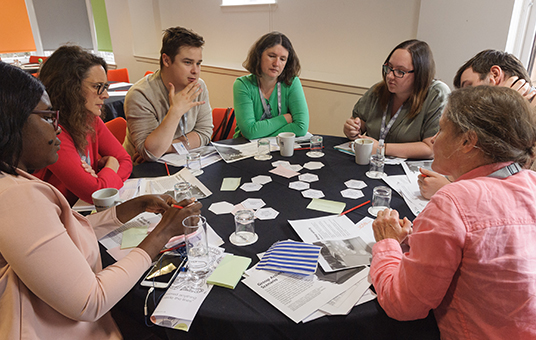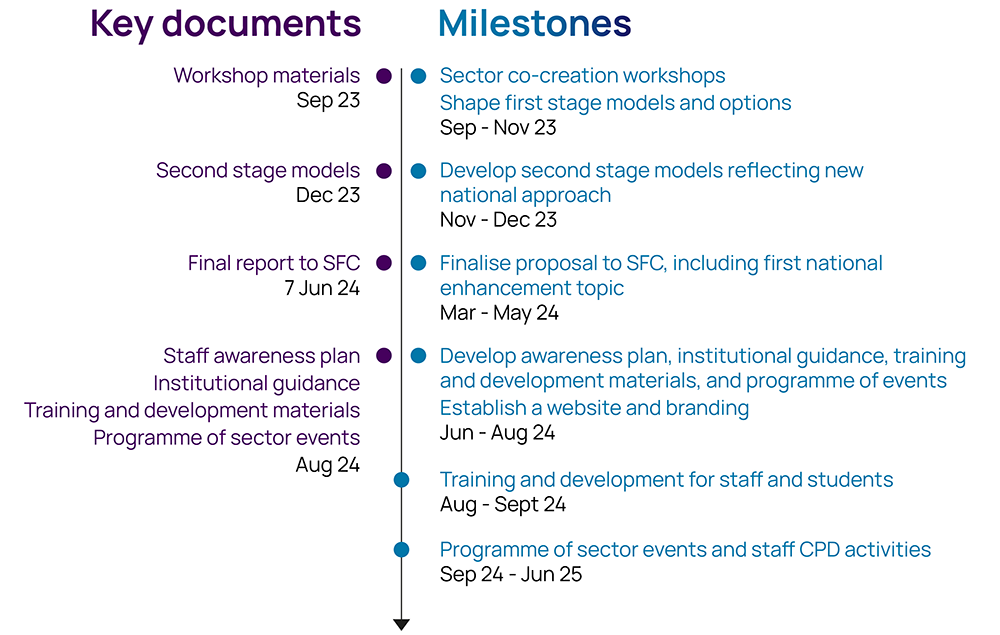This workstream from the Tertiary Quality Project will deliver a detailed plan for a new approach to tertiary sector enhancement activity to begin in academic year 2024-25, with recommendations and options for supporting structures and processes for its effective delivery. This work will build on the strengths of both sectors and be informed by data and evidence, annual evaluation activity, and external review that aligns with and supports the common approach to quality assurance. The Scottish Funding Council (SFC) has invited QAA to lead this workstream, engaging with the College Development Network (CDN) as critical partners in the development and implementation of this work.

QAA has established a Tertiary Enhancement Activity Advisory Group (TEAAG) to provide strategic advice and guidance. Members of the group include students and staff with significant expertise of supporting quality enhancement and assurance strategies, structures and pedagogy, who are familiar with enhancement activities within the college and university sectors.
SFC will agree the final recommendations from this workstream following advice from its Tertiary Quality Project Steering Group.
It is expected that this workstream will support the delivery of:
a culture of continuous improvement at institutions
enhanced sharing of learning, innovation and good practice across the tertiary education sector
improved objective setting at the outset of enhancement work, with clearer links between activity and expected outcomes
enhanced institutional reflection on, and ownership of, the quality of their provision
better evaluation of whether the activity has contributed to improved outcomes and learning experience for students and clearer links to how this will be evidenced.
In taking forward the development of a new approach to national enhancement activity, the workstream should consider and address the following issues:
- Impact: the national enhancement programme should, in its outputs, be able to demonstrate clear impact on both individual institutional performance as well as improvement and enhancement across the sector, and support for the delivery of national priority outcomes.
- Collaborative approaches: a range of collaborative models, including thematic and regional approaches, should be evaluated to ensure that institutions are empowered to engage in national thematic activity in a way that works for them.
- Coherence: ensure alignment with and support for the other elements of the common approach to quality assurance and enhancement - including annual, periodic, institution-led and external activity - so that they form a coherent whole to give assurance on the quality of provision.
- Supporting architecture and processes: consider appropriate structures and processes, including committees (both institutional and sector-wide), the role of agencies in leading/supporting enhancement work and models of funding to facilitate activity, to ensure the effective delivery and oversight of the new approach.
- Diversity: how best to support the distinctiveness and diversity of institutions and both sectors, including their capacity to focus on institution/sector specific issues, while retaining the coherence and benefits of a national enhancement programme.
- Expertise: how can best use be made of the expertise of agency partners.
- Value: maximise the impact of resource and ensure good value for public investment.
On 11 October, QAA hosted an in-person workshop at West Lothian College with more than 60 colleagues coming together to consider some of the more challenging aspects of designing a national approach to delivering enhancement activity.
Following a presentation outlining context, work done to date and the current landscape of thematic quality enhancement, participants were invited to engage in an activity to design a delivery model for a national approach to a tertiary sector enhancement activity.
Participants were arranged at nine tables, with six or seven people at each, and one person facilitating (having been briefed in advance). Each table was equipped with a deck of cards along with post-it notes, pens and a set of instructions.
Each of the cards had a design consideration on one side (for example, the length of activities, or the number of topics) and an option on the other. There were also a few blank cards on which participants could write their own options. For each design consideration, participants were asked to choose at least one option. Options were not intended to be mutually exclusive, and participants were informed that they could integrate as many options as they felt were necessary. They were also asked to rule out options that they thought would not work, placing these in a ‘no’ envelope.
We asked table facilitators to ensure that participants arranged their chosen options in a way that made sense to them. We also allowed time for participants to look at other tables’ work and provide feedback if desired.
In the set of instructions provided on each table, we provided three ‘wicked problems’ to help focus thinking:
- Learner transitions into a programme/course of study (including articulation)
- Student retention and positive outcomes
- Feedback on assessment.
However, we asked participants to design a model that would support the sector to address any such wicked problem. This exercise resulted in three outputs per table:
- A photograph of the model, complete with any amendments/additions to the cards
- An envelope with the rejected options
- Notes from table facilitators capturing some of the discussion and rationales for decisions (at time of writing, we have these from seven tables).
The following photos illustrate some of the designs produced.
 |  |
QAA is currently analysing the data gathered at the workshop to support the development of a series of proposed delivery models for the tertiary enhancement activity. Further details will be available soon!
Timeline

How to get involved
The QAA Scotland lead for this project is Dr Caroline Turnbull, Quality Enhancement Manager.
If you would like to get involved in this project, drop us an email.